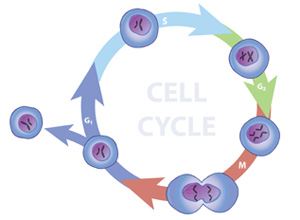 Cells can replicate themselves. The ability to reproduce is part of what defines cells as living things. This single characteristic also helps explain many other phenomena of life as we know it, including the emergence of multicellular organisms, the wide variety of tissues observed in living things, and even the scourge of cancer.
Cells can replicate themselves. The ability to reproduce is part of what defines cells as living things. This single characteristic also helps explain many other phenomena of life as we know it, including the emergence of multicellular organisms, the wide variety of tissues observed in living things, and even the scourge of cancer.
The process by which a single cell divides into two daughter cells is called mitosis. Mitosis is an important part of a cell's life cycle — but the rest of this cycle, collectively known as interphase, is hardly static. During interphase, the cell carries out the everyday biochemical reactions associated with metabolism, and it also engages in several processes that will guide it through the next round of division. In addition, throughout the cell cycle there are multiple monitoring systems and checkpoints that help the cell determine if and when it should divide, whether it's time to advance to the next phase, or whether it's time to die and make room for a younger, healthier cell.
The various checks on cell growth that occur during interphase allow tissues to revitalize themselves without increasing in size. When these restraints fail, the results — including the growth and spread of cancer — can be devastating.






 Cells can replicate themselves. The ability to reproduce is part of what defines cells as living things. This single characteristic also helps explain many other phenomena of life as we know it, including the emergence of multicellular organisms, the wide variety of tissues observed in living things, and even the scourge of cancer.
Cells can replicate themselves. The ability to reproduce is part of what defines cells as living things. This single characteristic also helps explain many other phenomena of life as we know it, including the emergence of multicellular organisms, the wide variety of tissues observed in living things, and even the scourge of cancer. 







